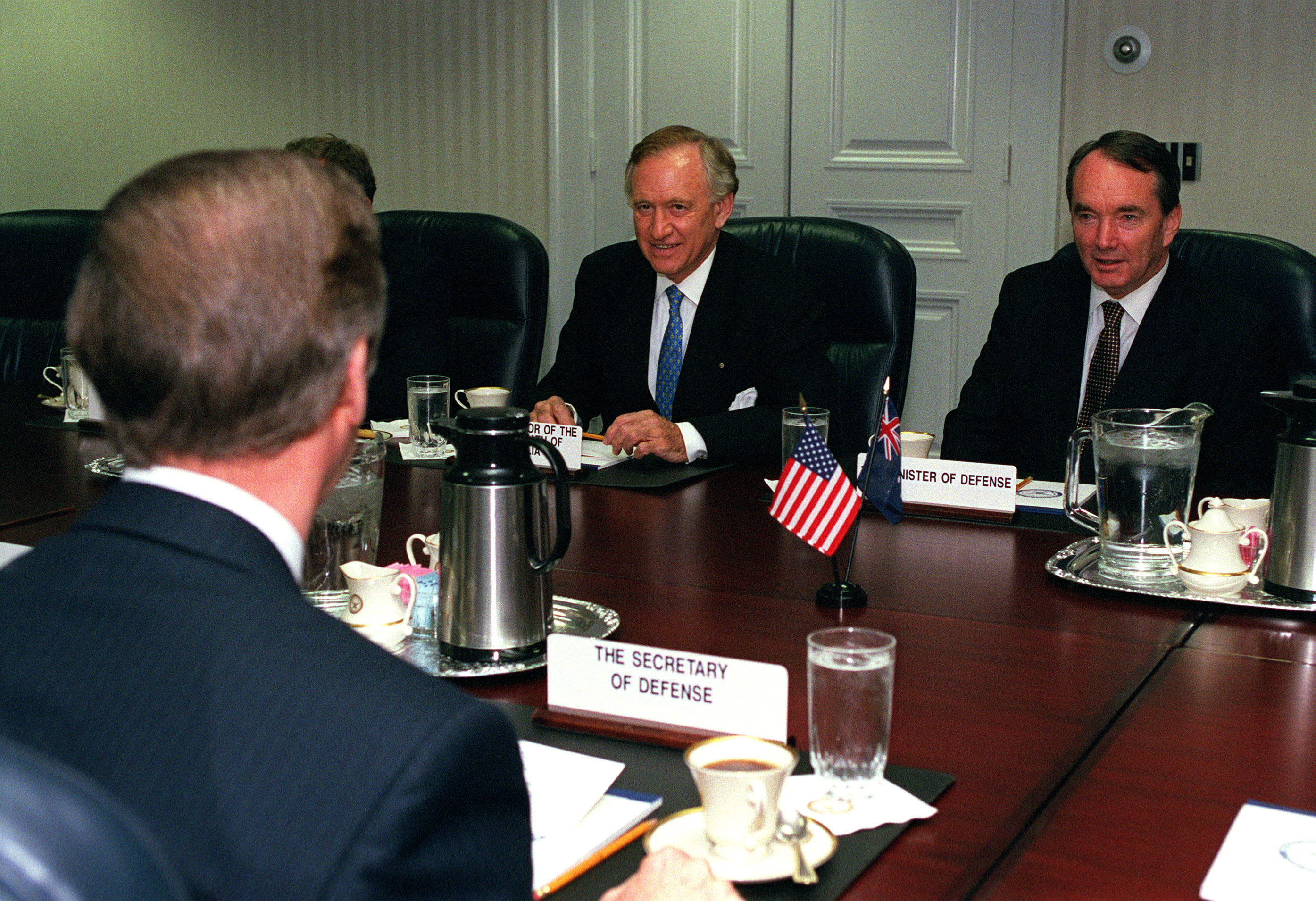- John Moore (Australian politician)
Infobox Prime Minister
name =John Moore

caption = John Moore (right) in 1999
order =46th Australian Defence Minister
term_start =1998
term_end = 2001
predecessor =Ian McLachlan
successor =Peter Reith
birth_date = birth date|1936|11|16|df=y
birth_place =Rockhampton,Queensland
death_date =
death_place =
spouse =
religion =
party =Liberal Party of Australia
languagesspoken =EnglishJohn Colinton Moore AO (born
16 November 1936 ),Australian politician, was a Liberal member of theAustralian House of Representatives for over 25 years, and Defence Minister from 1998 to 2001.Moore was born in
Rockhampton, Queensland . He was raised on a cattle station (or ranch) west of Bowen. His early education was through the Australian correspondence system used for isolated families. He finished his secondary education atThe Southport School , anAnglican boarding school for boys, before entering theUniversity of Queensland (UQ). Moore graduated from UQ with a Bachelor of Commerce with additional study inAccounting .Before he entered politics, Moore had a very successful career as a businessman and stock broker. He spent four years (1960-1963) with A.R. Walker & Co. before forming his own brokerage (John Moore & Company) in 1964. He was a member of the Brisbane Stock Exchange from 1961 until 1974. He grew his firm into the largest single trader business in Queensland, opening offices in regional centers there and in
New South Wales .He also held directorship or board membership in a number of Australian companies, such as Brandt Limited and Phillips. He was a board member of the Australian subsidiary of some multinational investment firms including Merrill Lynch and Citigroup.
Moore became a member of the Liberal Party in 1964, and by 1966 was serving in its state Executive Committee in Queensland. He was President of the Queensland Party twice; from 1973 to 1976 and again from 1984 to 1990. By party rules this also made him a member of the Federal Executive Committee (FEC) of the party. Indeed, he served on the FEC in one role or another for almost thirty years.
Moore was elected to the
Australian House of Representatives for theDivision of Ryan in Brisbane in 1975. His first ministerial office was during the fourth government formed by Prime MinisterMalcolm Fraser when he was Minister for Business and Consumer Affairs from 1980 to 1982. He was forced to resign from this portfolio when it was shown that fellow minister Ian MacKellar had brought a television into Australia without paying customs duty and that Moore as the minister responsible for the Customs Department had failed to adequately respond to a report of the incident.While the Labor governments of
Bob Hawke andPaul Keating where in power from 1983 until 1996 Moore served in the opposition'sShadow Cabinet for several key ministries including Finance, Industry and Commerce, and Communications.In March 1996 Moore joined the Cabinet in the new Coalition government of
John Howard , as Minister for Minister for Industry, Science and Tourism andVice-President of the Executive Council . In this position Moore had a major role in shaping new government policies affecting the motor vehicle and pharmaceutical industries. In cooperation with Industrial leaders, he created a long range policy package, "Investing for Growth."In 1996, Moore came close to being forced to resign a ministry for the second time in his career, when it was discovered that his share holdings included significant investments which could potentially create a conflict of interest with his ministerial portfolio. These investments breached the Howard's ministerial code of conduct, but Moore was allowed to stay on.
After the 1998 elections, Moore moved to the Defence Ministry. The most significant events during this period were the deployment of forces to
East Timor as a part of the U.N. peace-keeping effort and the upgrade and operationalisation of the Collins Class Submarine Fleet.Moore's most lasting legacy within the
Australian Defence Force was the White Paper "Defence 2000: Our Future Defence Force", released late in his ministry. John Howard said: "The Defence White Paper is the most far-sighted reshaping of Australia’s defence capability in a generation. It would not have been possible without John Moore’s determination to improve management within Defence and also win new resources for the ADF."When John Howard announced his cabinet reorganisation in December 2000,
Peter Reith replaced Moore as Minister for Defence. Moore resigned his seat in Parliament onFebruary 5 ,2001 , although he was not replaced officially as Minister of Defence until the new cabinet officers were sworn in onFebruary 14 . His resignation came at a bad time for the government, and the subsequent Ryan by-election was won by Labor.References
External links
* [http://www.defence.gov.au/whitepaper/34000.htm Department of Defence 2000 White Paper overview]
Wikimedia Foundation. 2010.
